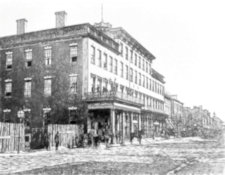The retreat from the Peninsula was almost immediately, (August 29, ’62,) followed by the “Second Bull Run” disaster, which again filled the Washington and Alexandria hospitals to overflowing and taxed the hospital workers to the utmost. Chaplain Hopkins, still on hard service in Alexandria, writes:
 Office of General Hospital,
Office of General Hospital,
12 O’clock Sunday Night.
Alexandria, August 31st, 1862.
My dear Mrs. Howland: These days are more terrible than any thing the nation has yet seen, and their horrors are at our very doors. Yesterday we sent 375 men to the north, and 433 to-day, and yet to-night we have opened a hall where, strewn on the floor, without even blankets, lie scores of wounded men unattended, with rebel lead festering in their bodies, but thankful for even that accommodation. Many of them came all the way from the battlefield in horrid army-wagons after lying in the rain and mud upon the field through the night; – patient, unmurmuring men. The best of New York and Boston blood oozes from their undressed wounds. I have just come from doing all that I could for them and am resting for the next train, which we momentarily expect at the foot of Cameron Street. . . . You have seen all this at Harrison’s Landing, but in my wildest dreams, when I first reported to you in Washington, I never thought of such scenes. Through all the wards confused heaps of torn and dirty clothes and piles of bloody bandages, tired attendants doing their best to make comfortable the poor fellows torn and mangled with shot and shell in every imaginable way. Things now, from what I hear in the hall, are coming into order, several surgeons having just reported themselves to Doctor Summers, besides large numbers of citizen attendants from the departments in Washington and from this city, too.
By the time this reaches you the papers will have informed you that last night the main part of our army on the left wing was compelled to fall back on Centreville. This morning the whole army was concentrated there, utterly disorganized, with the exception of Sumner’s Corps and some other fresh troops just arrived. They formed in front with their splendid artillery, and the rest of the army began to gather itself up for fresh encounters. The fight began again at three o’clock this afternoon, and men who left there at four o’clock say that it was going against us. God grant that the tide may have since turned.
Don’t apprehend our capture here, for the forts have been fully manned and supplied with ammunition; besides, we are going to whip them on the present battlefield to-morrow. I hear the whistle of the expected train with wounded and must stop this hasty letter.
The tide did turn. Chaplain Hopkins’ prayer was answered. The “fight which began at 3” the afternoon he wrote, ended with the repulse of the rebels by McDowell, and our troops rested that night at Centreville. There was a drop of comfort for H. H.’s poor men in the “knowledge, later, that their courage and suffering had not been all in vain, though the poor army was again, after all its frightful losses, just where it stood in March, six months before.